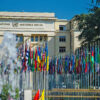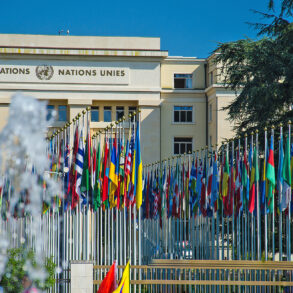In the debates following the attacks by radical terrorists in recent years, differences are often flattened – like between Islam and ideology.
Photo: Nuno21, Shutterstock
The murderous attack that claimed the lives of three people in Nice on Thursday, 29.10.2020, one of them “decapitated” (FAZ) or “almost decapitated” (ZDF) simply because they happened to be in the “wrong” place, shocked France, politics and the media. It seemed like a déjà vu of the murder of the history teacher Samuel Paty 12 days earlier. It is known for certain that the perpetrator was of Chechen origin and a Muslim.
What is known about the context is that the father of one of the teacher’s pupils spread the false report via video that the teacher had shown a naked picture of Mohammed in class. The father also published the teacher’s name and phone number. He also complained to the school administration and filed a complaint against the teacher for showing pornographic pictures to minors. The father, who was allegedly only “concerned about the well-being of his daughter,” quickly found followers on the net, who in turn sparked a shitstorm against the history teacher. Previously, the later murderer had not been able to find out the data of other targeted victims. He decided to cooperate with the “concerned father.” It is suspected that his sister left for Syria in 2014 to join the “Islamic State.”
The act of the 18-year-old immigrant from Chechnya did not fall from the sky. The Reuters news agency counts seven other terrorist attacks since 7 January 2015, when two murderers killed twelve people in the editorial office of the satirical magazine Charlie Hebdo. In the attack of 14 July 2016, when an armed murderer – also in Nice – drove a truck into a crowd of people, 86 people were killed. This crime was committed by a French citizen born in Tunisia. However, the “Islamic State” claimed the crime. In November 2015, a gang of ten Belgian and three French terrorists randomly murdered 130 people in Paris clubs.
The attempt to distil one or even “the” explanation for the terrorist attacks from the total of eight attacks since 2015 is hopeless and naïve to boot. The perpetrator profiles, scenarios and political constellations are too different. Media interpretations and speculations fluctuate between “lone perpetrator” (ARD 29.10.2020. 17.15 and FAZ v. 30.10.) and “Islamist terrorist attack” (President Macron on 29.10.2020). Such instant announcements and ad hoc announcements after terrorist attacks reveal only one thing: powerlessness and helplessness in the face of the complex constellation of occasions, motives, causes and contexts of such crimes. As a way out of this complexity, which cannot be completely unravelled, it is advisable to discuss individual aspects of the complex constellation of causes, motives, and contexts in more detail.
With its legislation and policy of separation of church and state, the “one and indivisible republic” of France created (1904/05) a fourth pillar of its self-image alongside “liberty, equality and fraternity,” which is usually forgotten – laicism. Not in the motives of its inventors, but in its political practice and its effect, laicism echoed the de-Christianisation campaign of the French Revolution under Robespierre.
Only today it is no longer about Christianity, monasteries, and the clergy, but about “Islam.” In the debates following the attacks by radical terrorists in recent years, differences are often flattened – such as those between Islam and Islamism, Muslims and Islamists, believers, and fundamentalists. Secularism quickly became a vehicle for the exclusion of religions and the demarcation of foreigners and strangers. “Laicism” fulfils the same function in France as “criticism of Islam” did for a time in the Federal Republic. Those who call for differentiation against generalisation and instrumentalisation by the media are seen, even in the liberal juste milieu, as trivialisers or naïve “do-gooders” who have allegedly not yet realised that “we” are at war with terrorism, Islam/Islamism (alternatively fundamentalism, jihadism, Salafism).
For Marine Le Pen and the radical nationalist Rassemblement National (RN), this ideological state of war has been a matter of course for decades, but one can also hear Éric Zemmour, columnist at the conservative Figaro as well as talk show host at two private TV stations, say on a weekly basis: “Muslims are our enemies.” The Minister of the Interior declared “war” on the “ideology of Islamism.” Patriotic republicans, from the political centre to the right, extensively invoke the fourth pillar of the republic – secularism – in their fight for the republic, making it the de facto second in the fight against “the” enemy.
Since the endless dispute over the wearing of headscarves in schools, which has been going on for thirty years, the claim to freedom from religion (of whatever kind), originally conceived in terms of individual rights, has become an instrument in the ideologically based melee against a religion – the amalgam that the media alloy into “Islam/Islamism.” They know little more about this than those murderous terrorists notoriously leave the scene of the crime shouting “Allahu Akbar” before they are usually shot dead by the police. Secularism, thus armed with fundamentalism, acts as a mood maker in the political debates following murderous terrorist attacks.
Because the murdered Samuel Paty was a teacher, the school moved to the centre of attempts to explain the murder. Since Jules Ferry (1832-93) – many times a minister in the Third Republic (1870-1940) – the school has been regarded as the engine of republican equality and equal treatment of all citizens, regardless of their origin and religion. Ferry introduced compulsory free primary education in 1880 and curbed the influence of Jesuits on the school system. To this day, Ferry therefore acts as a kind of grandfather of secularism. Paty’s murder was reinterpreted in the media melee as a symbol of an attack on a pillar of the republic – secularism. The fact that Ferry was also one of the most unquestioning propagandists of French colonial policy in Africa and Indochina and devised the mission civilisatrice (“civilising mission”) remained, by contrast, what it had long been, a side issue. In 1883, Ferry spoke of the “duty of the superior race to civilise the inferior.” The murder of Samuel Paty has nothing at all to do with an attack on the institution of school or Ferry’s merits as a republican minister of education, but a great deal to do with the school experiences of Muslim immigrants.
Jules Ferry associates today’s conditions in French schools with the fact that they reproduce the colonialist divide in their material, financial, personnel and organisational equipment in suburbs inhabited by Muslim immigrants. The social and cultural ills in the suburbs are well known and well researched, but politicians are content with announcements of promises and master plans for reform.
The neglect of such zones (“banlieues”) by state social and educational policies fostered, in terms of a driving house, the creation of the vicious circle of school failure, unemployment, gang formation, criminalisation and even imprisonment. This often enabled the political radicalisation of young men by religious fundamentalists and fanatics who acted as “helpers” or “big brothers” on a temporary basis. The large number of allegedly or really religiously inspired terrorist attacks did not break out like a thunderstorm over France because of “Islam.” It is the result of decades of neglect and failed education, housing, and social policies.
Since the sociologist Pierre-André Taguieff coined the word islamo-gauchisme (“Islam-left extremism”) in 2002 – in reference to the term Islamo-fascism popular in the USA and Israel – conservative French intellectuals have resorted to constructing a complicity between leftists and “Islamists.” At the very least, they suspect leftists of chummy silence about the quasi-religiously motivated terror. The political co-responsibility of the French elites for the current state of the republic is thus only concealed.











